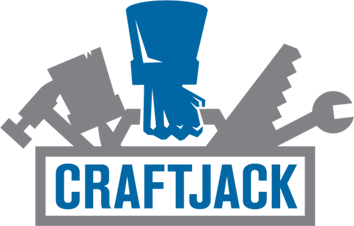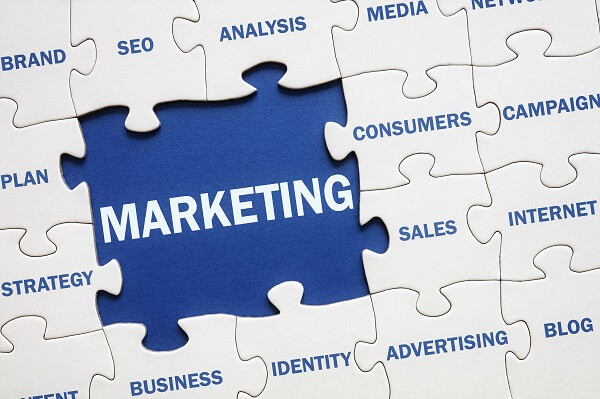A Contractor’s Guide to Online Marketing Terms

As a small business owner, you’re fully aware of the importance of spinning plates. You don’t have HR, marketing, sales, graphic design, finance, or IT departments — you’re all of these departments rolled into one. When it comes to marketing, new strategies and techniques emerge each year. Along with such rapid innovation comes an ever-growing list of jargon, and the better you understand it, the better equipped you are for high profits and long-term success.
Read on to discover our comprehensive guide to digital marketing words. They’ll enhance your marketing efforts so they reach the widest possible audience.
The CraftJack Reputation Manager helps contractors take their businesses to the next level. Start your 30-day free trial today.

Marketing Campaign Strategy
There’s no denying that marketing and buzzwords go hand in hand. Here are some of the most common words relating to your overall marketing strategy.
Engagement: Engagement is the signal that your internet marketing techniques are working. It means website visitors are taking action and clicking through or sharing your webpages.
Customer experience: Customer experience is the journey that describes every interaction a prospect has with your brand, from the first view of a post on social media through the post-purchase feedback email.
Lead generation: This is the way you initiate interest from consumers to start developing a sales pipeline.
Conversion rate: The conversion rate is the percentage of website visitors who become customers or subscribers.
Return on investment: ROI is the percentage of profits that can be directly attributed to your marketing efforts.
Click-through rates: This is the rate of webpage visitors who click a link divided by the number of times your ad is displayed.
Target audience: Your brand values and mission statement will define who your target market is — the demographic of people your product or service will appeal most to.
Potential customer: Potential customers make up the lion’s share of visitors to your website and social media pages; they haven’t made a purchase or booking yet.
Existing customer: Although they’re the minority, nurturing a solid base of regulars, or existing customers, is the key to long-term success.
Lookalike audiences: Lookalike audiences are the untapped market of customers similar to your target market.
SEO And Local SEO
SEO is one of the most important and powerful tools for any marketer, and there’s a lot of marketing terminology to learn.
Search engine optimization: SEO is an umbrella term that describes all the tweaks and tools that increase traffic to your site from search engines.
Keyword research: Keyword research is essential so you get a broad range of primary and semantic keywords to use in the right quantities.
Keyword stuffing: If you don’t do keyword research, you risk overusing certain strings of key phrases, which can negatively impact your search engine rankings.
Meta description and title: It’s essential that your website and blog are constructed in a way that search engine algorithms can read, including the correct metadata and schema markup.
Google My Business: You should optimize your Google My Business profile to ensure you appear higher up in local search rankings.
Local pack: The local pack is the collection of three businesses that appears next to the map on Google’s SERP.
State and city pages: Your website should include specific pages for every location you operate in.
Authoritative source: When you use links on your website, they should only be from authoritative sources. This tells search engines you are also a reputable source.
Content Marketing Terms
To make sure your SEO strategy reaches as many potential customers as possible, you’ll need a solid content marketing plan in place.
Content marketing: Content marketing is a way of providing useful information to potential and existing customers and establishing yourself as a thought leader. It also contributes to your SEO strategy.
Call to action: Every piece of content should include a clear CTA to direct website visitors to take action.
Email marketing: Email marketing will be highly effective as long as email continues to be such a popular form of contact. With most people checking their email regularly, well-timed emails are an excellent way to stay fresh in your customers’ minds.
Reputation Management
One of the most substantial aspects of your online marketing efforts is reputation management. The internet is full of places for people to give feedback — good and bad — about your company.
Local listing management: Reputation management services can help you ensure your information on customer-facing platforms are always up to date.
Review management: To make the most out of the internet, you need to know what everyone’s saying about your company. Trawling though the entire internet for each mention is time-consuming, but review management tools pull all the data you need into one place.
Bulk responding: Customers love it when their favorite brands and businesses interact with them and make them feel valued. Reputation management tools let you respond in bulk, saving time while delighting your client base.
Analytics: Analytics and data are your best friends. They let you know in real time what’s working so you can refine your marketing efforts and improve future strategy.
CraftJack Can Boost Your Reputation
There’s no doubt you’ve mastered the art of plate spinning, but it’s essential that you delegate some of your responsibilities so you can focus on the things that matter most. CraftJack can help you monitor and manage your online presence so you’re free to deliver an exceptional customer experience and improve the bottom line.



